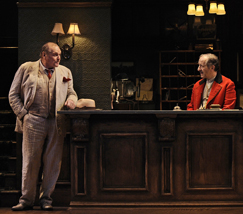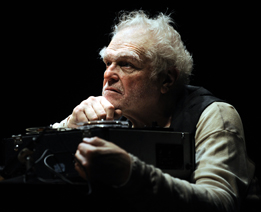Goodman Theatre's Double-Bill Hughie and Krapp's Last Tape: Two Sides Of The Same Lonely
By Julienne Bilker in Arts & Entertainment on Feb 4, 2010 10:40PM

photo of Brian Dennehy and Joe Grifasi In Hughie by Liz Lauren
Hughie begins with a dim light barely illuminating a weary man at a desk. The light slowly expands, revealing the man to be the night clerk at a seedy hotel. Enter Erie Smith (Dennehy), the kind of alcoholic whose stumble is easily confused for swagger and a has-been who, we begin to realize, never-was. Though Erie, boisterous and clearly looking for an audience, is in mourning for Hughie, the hotel's recently deceased night clerk, it is not because they were great friends. "Hughie liked to kid himself he was my pal," he says at one point, but clearly Erie is the one kidding himself. He is visibly shaken by the new night clerk's (Joe Grifasi) lack of interest, rambling about his exploits in what is an ultimately tenuous but at least momentarily successful attempt to replace his old one-man fan club.
What makes this show so touching is that it's almost sweet - almost. Grifasi's droopy-dog kind of look made us wonder if his character was stupid, disinterested, or nearing comatose - the contrast with Dennehy's high-energy is funny, but Hughie's humor floats in the shadow of the larger picture. There is a point at which Erie starts upstairs to his room, but even though it's around 4am in the play, we knew there was no way he would actually leave. For a man like Erie, being alone is the most frightening feeling imaginable. It's heart-breaking to watch. Under Goodman Artistic Director Robert Falls, Dennehy and Grifasi bring this show to life while simultaneously knocking the wind out of it.

photo of Brian Dennehy in Krapp's Last Tape by Liz Lauren
Each year, on his birthday, Krapp has recorded himself describing events and feelings of the last year - it's telling that he refers to them as "post-mortems." We were reminded of a line from T.S. Eliot's The Love Song Of J. Alfred Prufrock: "I have measured out my life with coffee spoons." Krapp's life is measured in reel to reel tapes, allowing him the dreadful opportunity to relive past heartache and regret - he listens, at times with visible pain, no matter how much booze he's used to steel himself. Besides a few words here and there - mostly grunts, actually - the entire text of the piece comes out of the tape recorder. We observe Krapp observing himself - and lest you think that sounds totally boring, we assure you that it's fascinating. Director Jennifer Tarver has brought out the best in one of the best.
In his program note, Robert Falls describes the link between these two plays better than we can, so we'll leave you with his words. "...we are the sum of our illusions...Without those essential self-created fantasies of ourselves to present to the world, and a mirror to see them in, we are nothing."
Hughie and Krapp's Last Tape, through February 28. Goodman Theatre, 170 N Dearborn. Tickets are $25-$83.